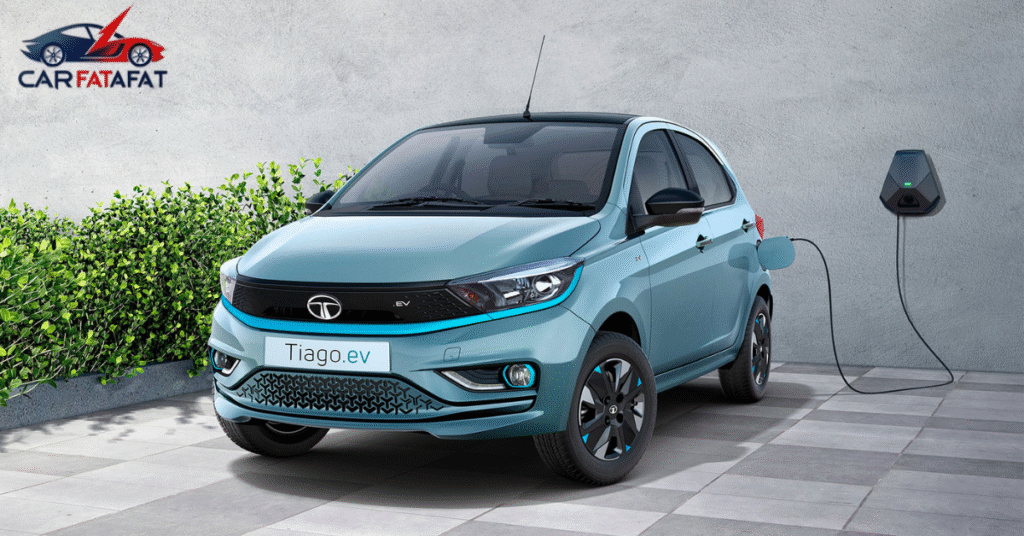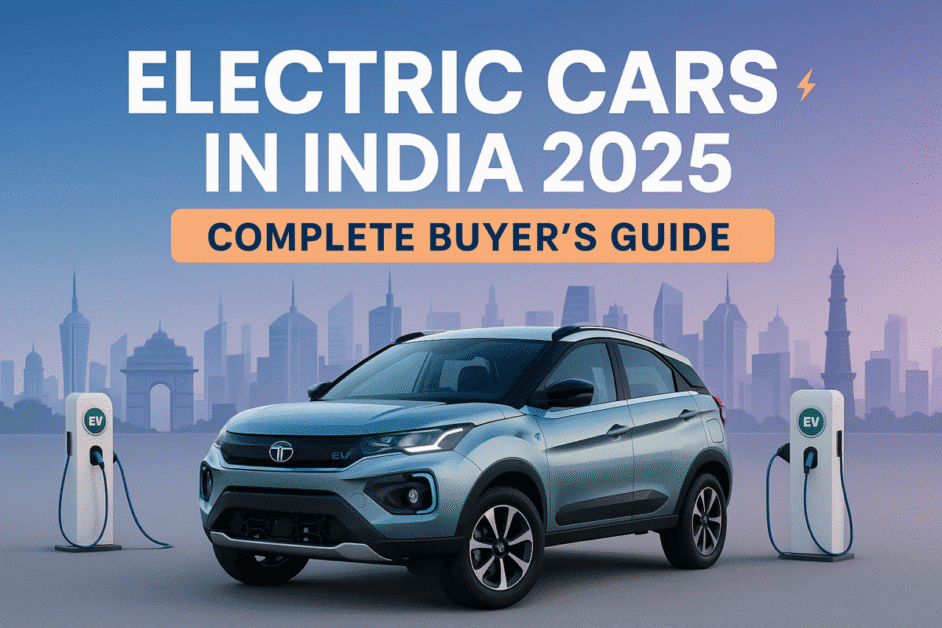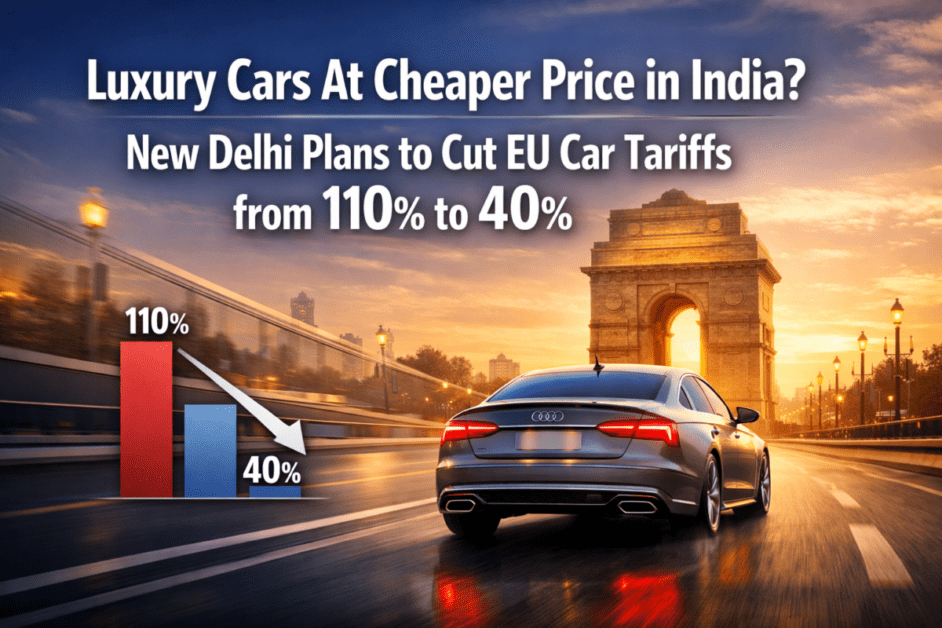India’s automotive landscape is experiencing a revolutionary transformation as electric vehicles (EVs) rapidly gain momentum across the nation. With government incentives, improving charging infrastructure, and an expanding lineup of affordable electric cars, 2025 marks a pivotal year for EV adoption in India. Whether you’re a first-time buyer or considering switching from petrol to electric, understanding the current EV market is crucial for making an informed decision.
Key Takeaways
- 🚗 Market Growth: The EV market in India is expected to grow by over 50% in 2025, with more affordable options entering the market
- 💰 Cost Benefits: Electric cars offer significantly lower running costs compared to petrol vehicles, with savings of up to ₹3-4 per kilometer
- 🔋 Infrastructure Expansion: Charging infrastructure has expanded to over 12,000 public charging stations across India
- 🎯 Government Support: Enhanced subsidies and incentives make EVs more accessible, with benefits up to ₹3 lakh for certain models
- ⚡ Technology Advancement: Improved battery technology now offers ranges of 300-500 km on a single charge
Understanding the EV Revolution in India
The electric car market in India has witnessed unprecedented growth, transforming from a niche segment to a mainstream automotive category. The ev revolution in india is driven by multiple factors including environmental consciousness, government policies, and technological advancements.
Why 2025 is the Perfect Year for EV Adoption
India in 2025 presents the ideal scenario for EV buyers. The charging infrastructure has matured significantly, with dc fast charging stations available on major highways. Additionally, car manufacturers have introduced models across various price segments, making electric mobility accessible to a broader audience.
The future of transportation in india is clearly electric, with major brands like tata, Mahindra, and international players launching compelling electric vehicles. The indian market now offers options ranging from compact city cars to premium electric suvs.
Top Electric Cars in India 2025
Budget-Friendly Options (Under ₹15 Lakh)
1. Tata Tiago EV

The tata tiago ev continues to be a popular choice for first-time EV buyers. Priced starting at ₹8.69 lakh, it offers:
- Range: 315 km on a single charge
- Charging Time: 0-80% in 57 minutes (fast charging)
- Features: Connected car technology, dual airbags, ABS with EBD
2. MG Comet EV
The mg comet ev is India’s most affordable electric car, perfect for city commuting:
- Price: Starting at ₹7.98 lakh
- Range: 230 km
- Unique Features: Compact design, smartphone connectivity
Mid-Range Electric Vehicles (₹15-25 Lakh)
1. Tata Nexon EV
The tata nexon ev remains one of India’s best-selling electric SUVs:
- Range: Up to 453 km (Max variant)
- Price: ₹14.99 – ₹19.94 lakh
- Highlights: Premium interior, advanced safety features, robust build quality
2. MG ZS EV
The mg zs ev offers premium features and international build quality:
- Range: 461 km
- Price: ₹21.99 – ₹25.88 lakh
- Features: Panoramic sunroof, 10.1-inch touchscreen, connected car tech
Premium Electric Cars (Above ₹25 Lakh)
1. Hyundai Ioniq 5
Hyundai‘s flagship EV brings cutting-edge technology to India:
- Range: Up to 631 km
- Price: ₹44.95 lakh onwards
- Innovation: Ultra-fast charging, vehicle-to-load capability
2. BMW iX
For luxury EV enthusiasts:
- Range: Up to 635 km
- Price: ₹1.21 crore onwards
- Premium Features: Advanced driver assistance, luxury interiors
Upcoming Electric Cars in India 2025
Highly Anticipated Launches
Maruti Suzuki eVX
Maruti suzuki is set to launch its first electric SUV:
- Expected Price: ₹15-20 lakh
- Range: 550+ km (expected)
- Launch Timeline: Mid-2025
Mahindra BE 6
The mahindra be 6 represents Mahindra’s new electric platform:
- Expected Features: Coupe-SUV design, advanced tech
- Range: 450+ km (expected)
- Price: ₹18-25 lakh (estimated)
Tata Harrier EV
The tata harrier ev will bring electric power to Tata’s popular SUV:
- Expected Range: 400+ km
- Launch: Late 2025
- Price: ₹22-28 lakh (estimated)
For more insights on the latest automotive launches, check out the Hyundai Creta 2025 launched and compare it with the Hyundai Creta 2025 vs Kia Seltos 2025 to understand market dynamics.
Charging Infrastructure in India 2025
Public Charging Network
The charging infrastructure in India has expanded dramatically:
| Charging Type | Number of Stations | Charging Speed | Typical Locations |
|---|---|---|---|
| Slow Charging (AC) | 8,500+ | 3-8 hours | Residential, offices |
| Fast Charging (DC) | 3,500+ | 30-60 minutes | Highways, malls |
| Ultra-Fast Charging | 200+ | 15-30 minutes | Premium locations |
Home Charging Solutions
Most EV owners prefer home charging for convenience:
- Installation Cost: ₹15,000-50,000
- Charging Time: 6-8 hours for full charge
- Monthly Cost: ₹1,500-3,000 (depending on usage)
Charging an Electric Car: Best Practices
- Regular Charging: Maintain battery between 20-80% for optimal life
- Fast Charging: Use sparingly to preserve battery health
- Home Setup: Install dedicated charging point for convenience
- Planning: Use apps to locate charging stations during long trips
Government Incentives and Policies
FAME II Scheme Benefits
The government continues to support EV adoption through various incentives:
Central Government Incentives
- Subsidy: Up to ₹1.5 lakh for electric cars
- Tax Benefits: Reduced GST (5% vs 28% for ICE vehicles)
- Income Tax: Additional deduction of ₹1.5 lakh on EV loan interest
State-Level Incentives
Different states offer additional benefits:
| State | Road Tax Waiver | Registration Fee | Additional Benefits |
|---|---|---|---|
| Delhi | 100% | Waived | ₹5,000 scrapping incentive |
| Maharashtra | 100% | Waived | Toll exemptions |
| Gujarat | 100% | Waived | Electricity tariff benefits |
| Karnataka | 100% for 5 years | Waived | Priority parking |
Total Cost of Ownership Analysis
Running Costs Comparison
Lower running costs are a major advantage of electric vehicles:
Electric vs Petrol: 5-Year Cost Analysis
- Electric Car (Tata Nexon EV): ₹18.5 lakh total cost
- Purchase Price: ₹16 lakh
- Fuel/Electricity: ₹1.2 lakh
- Maintenance: ₹0.8 lakh
- Insurance: ₹0.5 lakh
- Petrol Car (Similar segment): ₹22.3 lakh total cost
- Purchase Price: ₹12 lakh
- Fuel: ₹6.5 lakh
- Maintenance: ₹2.8 lakh
- Insurance: ₹1 lakh
Maintenance Benefits
Electric vehicles offer significant maintenance advantages:
- No Engine Oil: Saves ₹5,000-8,000 annually
- Fewer Moving Parts: Reduced wear and tear
- Brake Regeneration: Extended brake pad life
- Software Updates: Over-the-air improvements
Driving Experience and Performance
Instant Torque and Smooth Operation
Electric cars provide a superior driving experience:
- Instant Acceleration: Maximum torque from 0 RPM
- Silent Operation: Minimal noise and vibration
- Smooth Power Delivery: No gear shifts required
- Responsive Handling: Low center of gravity due to battery placement
Range and Real-World Performance
Modern electric cars offer practical ranges for Indian conditions:
- City Driving: 15-20% more range due to regenerative braking
- Highway Driving: Slightly reduced range at high speeds
- Climate Impact: AC usage reduces range by 10-15%
- Driving Style: Eco-mode can extend range by 20-30%
Choosing the Right Electric Vehicle
Factors to Consider
1. Daily Driving Needs
- Assess your typical daily mileage
- Consider charging options at home/office
- Plan for occasional long trips
2. Budget and Financing
- Factor in government incentives
- Compare total cost of ownership
- Explore EV-specific loan schemes
3. Charging Infrastructure
- Evaluate charging options in your area
- Consider home charging installation
- Plan for travel routes with charging stations
Buying Guide Checklist
✅ Research Models: Compare specifications, features, and reviews
✅ Test Drive: Experience the electric motor performance
✅ Charging Plan: Assess home and public charging options
✅ Incentives: Calculate total savings from subsidies
✅ Service Network: Ensure adequate service network across india
✅ Warranty: Check battery and vehicle warranty terms
✅ Insurance: Compare EV insurance costs and coverage
Interactive EV Comparison Tool
🚗 Electric Car Finder 2025
Find the perfect electric car for your needs and budget
Battery Technology and Range Considerations
Electric Motor and Battery Advancements
Modern electric vehicles feature sophisticated electric motor technology:
- Permanent Magnet Motors: High efficiency and compact design
- Battery Chemistry: Lithium iron phosphate (LFP) and NMC batteries
- Thermal Management: Advanced cooling systems for optimal performance
- Regenerative Braking: Energy recovery during deceleration
Real-World Range Factors
Several factors affect EV range in Indian conditions:
- Temperature: Extreme heat or cold can reduce range by 10-20%
- Driving Style: Aggressive acceleration reduces efficiency
- Terrain: Hills and mountains impact range significantly
- Vehicle Load: Additional passengers and cargo affect performance
EV Market Trends and Future Outlook
EV Market in India: Growth Projections
The ev market in india is experiencing exponential growth:
- 2025 Sales Target: 1 million+ electric vehicles
- Market Share: EVs expected to capture 15% of new car sales
- Investment: ₹50,000+ crore in EV manufacturing and infrastructure
- Employment: 50 lakh+ jobs in the EV ecosystem by 2030
Emerging Technologies
Software Updates and Connectivity
Modern EVs offer over-the-air updates:
- Performance Improvements: Enhanced efficiency and features
- Security Updates: Protection against cyber threats
- New Features: Additional functionality without hardware changes
Battery Electric Vehicles: Next-Generation Tech
- Solid-State Batteries: Faster charging and higher energy density
- Wireless Charging: Inductive charging technology
- Vehicle-to-Grid: EVs as mobile power sources
Financing and Insurance for Electric Cars
EV-Specific Loan Options
Banks offer attractive financing for electric vehicles:
- Interest Rates: 0.5-1% lower than conventional car loans
- Loan Tenure: Up to 8 years for premium EVs
- Processing Fees: Reduced or waived for green vehicles
Insurance Considerations
EV insurance differs from conventional vehicles:
- Premium: 10-15% higher due to expensive components
- Battery Coverage: Comprehensive battery insurance essential
- Specialized Repairers: Network of EV-certified service centers
For those considering budget options, explore our guide on best cars under 1 lakh or check out best second-hand cars in India for alternative options.
Service and Maintenance Network
Service Network Across India
Major EV manufacturers have expanded their service infrastructure:
| Brand | Service Centers | Cities Covered | 24/7 Support |
|---|---|---|---|
| Tata | 450+ | 200+ | Yes |
| MG | 120+ | 100+ | Yes |
| Hyundai | 350+ | 150+ | Yes |
| Mahindra | 300+ | 180+ | Yes |
Maintenance Best Practices
To maximize your EV’s lifespan:
- Regular Software Updates: Keep vehicle software current
- Battery Care: Avoid deep discharge and extreme temperatures
- Tire Maintenance: Check pressure regularly for optimal efficiency
- Brake System: Service regenerative braking system annually
Common Myths About Electric Cars
Myth 1: “EVs Have Limited Range”
Reality: Modern EVs offer 300-600+ km range, sufficient for most users
Myth 2: “Charging Takes Too Long”
Reality: Fast charging provides 80% charge in 30-60 minutes
Myth 3: “EVs Are Too Expensive”
Reality: Lower running costs offset higher purchase price within 3-4 years
Myth 4: “Limited Charging Infrastructure”
Reality: 12,000+ public charging points with rapid expansion ongoing
Regional Considerations for EV Buyers
Metro Cities
- Advantages: Extensive charging network, government incentives
- Challenges: High electricity rates in some areas
- Best Models: Compact EVs like Tata Tiago EV, MG Comet EV
Tier-2 Cities
- Growing Infrastructure: Rapid charging network expansion
- Cost Benefits: Lower electricity rates
- Recommended: Mid-range SUVs like Tata Nexon EV
Rural Areas
- Challenges: Limited public charging
- Solutions: Home charging essential
- Suitable Models: High-range vehicles for longer trips
Environmental Impact and Sustainability
Carbon Footprint Reduction
Electric vehicles significantly reduce environmental impact:
- Zero Tailpipe Emissions: No local air pollution
- Renewable Energy: Solar charging further reduces carbon footprint
- Lifecycle Analysis: 60-70% lower emissions than petrol cars
Electric Mobility and Smart Cities
EVs contribute to India’s smart city initiatives:
- Reduced Noise Pollution: Quieter urban environments
- Grid Integration: Vehicle-to-grid technology
- Air Quality: Improved urban air quality
Making the Switch: Transition Guide
From Petrol to Electric
Week 1-2: Research Phase
- Compare models and specifications
- Calculate total cost of ownership
- Assess charging infrastructure in your area
Week 3-4: Test and Decide
- Schedule test drives
- Finalize financing options
- Plan home charging installation
Month 2: Purchase and Setup
- Complete purchase formalities
- Install home charging point
- Download relevant apps for charging networks
Month 3 onwards: Enjoy the Experience
- Adapt to new driving patterns
- Explore different charging options
- Share experience with others considering EVs
For insights into traditional vehicles, you might also want to read about the Hyundai launches the new Verna or explore our top 10 Indian cars guide.
Essential Accessories for EV Owners
Must-Have Accessories
- Portable Charging Cable: For emergency charging
- Charging Apps: Locate and book charging stations
- Energy Monitor: Track consumption and efficiency
- Emergency Kit: EV-specific roadside assistance tools
For comprehensive car care, check our guides on best car tyres in India and best dash cam for car to enhance your driving experience.
Future-Proofing Your EV Purchase
Technology Considerations
When choosing an electric vehicle for 2025:
- OTA Updates: Ensure the vehicle supports over-the-air updates
- Charging Compatibility: CCS2 standard for future-proofing
- Battery Warranty: Minimum 8-year battery warranty
- Resale Value: Choose established brands with strong service networks
Upcoming Models to Watch
Several exciting launches are expected in 2025:
- Maruti Suzuki eVX: India’s most affordable electric SUV
- Tata Sierra EV: Iconic SUV returns in electric form
- Mahindra XUV.e8: Premium electric SUV
- Hyundai Creta EV: Electric version of India’s popular SUV
Conclusion
The electric cars in india 2025 landscape offers unprecedented opportunities for buyers seeking sustainable, economical, and technologically advanced transportation. With improved charging infrastructure, substantial government incentives, and a diverse range of models from budget-friendly to premium, there has never been a better time to join the ev revolution.
Whether you’re looking for your first electric vehicle or upgrading from a conventional car, the 2025 guide provides all necessary information to make an informed decision. From the affordable Tata Tiago EV to the premium Hyundai Ioniq 5, there’s an electric car for every budget and requirement.
The future of transportation in india is electric, and 2025 marks the tipping point where EVs become mainstream. With lower running costs, minimal maintenance, superior driving experience, and environmental benefits, electric vehicles represent the smart choice for modern Indian consumers.
Next Steps
- Research: Use our comparison tool to shortlist suitable models
- Test Drive: Experience different EVs to find your preference
- Plan: Assess charging infrastructure and installation requirements
- Purchase: Take advantage of current incentives and financing options
- Enjoy: Embrace the smooth, silent, and sustainable driving experience
The transition to electric mobility is not just about buying a car—it’s about joining a movement toward cleaner, smarter, and more efficient transportation. Make 2025 the year you discover the top electric cars and become part of India’s electric future.
For more automotive insights and comparisons, explore our comprehensive guides on best sedan cars and other vehicle categories to make informed decisions about your automotive needs.













